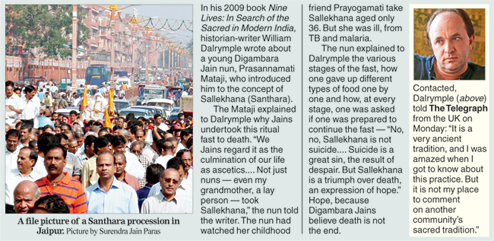Jaipur, Aug. 10: Rajasthan High Court today banned Santhara, a centuries-old Jain practice of starving oneself to death to attain salvation, which rights activists have compared to suicide, euthanasia and even Sati.
Justice Sunil Ambawani made Santhara a punishable offence under penal code sections 306 (abetment of suicide) and 309 (attempted suicide), punishable by up to 10 years and one year in jail, respectively.
The abetment tag is meant for family and approximate community members of someone resorting to Santhara, which activists allege is sometimes a way of getting rid of elderly relatives and grab their share of property.
Jain organisations raised the question of minority rights and declared they would appeal the verdict, which said: "The respondents failed to establish that Santhara is an essential religious practice without which the following of Jain religion is not permissible."
A former judge of the high court, Justice Panachand Jain, insisted that Santhara had nothing in common with suicide or forced Sati.
"Suicide is usually done when people are in depression. Here people are not in depression - they give up food of their own accord, for days on end, to attain spiritual salvation," Justice Jain said.
"There are instances of people who have taken up Santhara reversing it when they realised their body was not ready to attain salvation. This petition violates Article 25, 26(b) and 29(1) of the Constitution that protect the religious and cultural rights of the minorities."
A public interest petition moved in 2006 by rights activist Nikhil Soni led to today's verdict. The court also heard out some Jain organisations, which opposed a ban.
"It's a social evil that should be considered suicide. It's unconstitutional, too, since Article 21 of our Constitution guarantees the right to life but not death," Soni told The Telegraph.
Two acts of Santhara in Jaipur had stirred a national debate in late 2006. First, Bimla Devi Bhansali, 60 years old and diagnosed with terminal cancer, fasted to death.
Soni alleged that Bimla Devi's relatives had publicly announced it was her own decision but in her final hours, the frail woman appeared to make a last-ditch request for food and water. Her voice was drowned out by the bhajans being sung around her, he said.
"It shook me up. It convinced me that Santhara is suicide in the cloak of religious practice," Soni said. "To me, Santhara is a way devised by the family to get rid of the economic burden of caring for its elderly."
Soni moved his petition after another woman, Keila Devi Hirawat, 93, resorted to Santhara the same year.
Opponents of the practice also ask whether it isn't inhuman to let people wither away without food, water or medical help.
"The end can come quickly or late. Why do they have to suffer so much to attain spiritual salvation?" asked Kavita Srivastav, a social activist.
According to the Jain text Ratnakarandsravakacare, Santhara is permitted to the old, those afflicted with an incurable disease and those faced with a drought or grave physical danger.
It's supposed to be the ultimate route to moksha - freedom from the cycle of life and death. Most of those who sit on Santhara draw crowds seeking a darshan and blessings and are honoured with huge funeral processions.
"I personally believe in Santhara. That is something you do in the last stages of your life when you think it is time to leave the world and cleanse yourself of all the bad karma," said Ravi Jain, 38, a chartered accountant in Calcutta.
"If the law says it is illegal, then we have to accept it, but I don't think there is anything wrong in that. It should be left to one's personal choice."
Shekhar Hattangadi, a filmmaker and teacher of constitutional law whose Santhara won awards at the recent Bangalore Short Film Festival and Kolkata Shorts International Film Festival, said he was struck by the high court proceedings.
"It was a unique case where both litigants invoked Article 21 - the fundamental right to live and the protection of their right to die. I think the high court has gone by the precedent of the Supreme Court ruling in the Gian Kaur case."
In the 1996 case, a five-judge Supreme Court bench had ruled that Section 309 did not violate Article 21.
In March 2011, the apex court allowed conditional passive euthanasia under strict monitoring while recommending that Parliament delete the "anachronistic" Section 309 because a person attempting suicide is in "depression, and hence he needs help rather than punishment". Voluntary euthanasia is banned in India.












